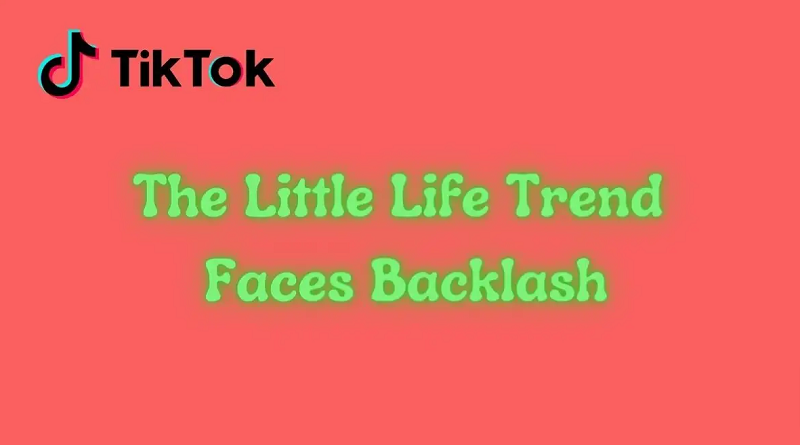Introduction
The Little Life trend on TikTok has recently stirred up a whirlwind of controversy and backlash due to its interpretation and use of themes from the novel “A Little Life” by Hanya Yanagihara. Initially emerging as a homage to the book’s emotional complexity, this trend has faced substantial criticism on multiple fronts. In this article, we’ll delve into the reasons behind this backlash, the concerns it has raised, and how creators and viewers can navigate this sensitive topic on social media.
Trivialization of Trauma
One of the primary concerns raised by critics is the perceived trivialization of trauma. Participants in the trend often create videos that showcase seemingly mundane moments, set to the tune of “I Think I Like This Little Life” by The Wombats. However, this lighthearted portrayal of everyday activities juxtaposed with a song originating from a narrative deeply entrenched in trauma and abuse has sparked concern. Critics argue that this approach risks diluting the gravity of the novel’s themes, potentially undermining the struggles faced by individuals who have experienced trauma.
Exploitation of Sensitive Topics
Another issue highlighted by detractors is the potential exploitation of sensitive topics for the sake of engagement and views. There’s a worry that creators may be leveraging the shock value associated with the novel’s dark themes without engaging thoughtfully or meaningfully with the complex issues it raises. This approach, some argue, can trivialize the depth of the subject matter and undermine the importance of addressing these issues with care and sensitivity.
Inaccurate Representation of Mental Health
Critics have also expressed concerns about the inaccurate representation of mental health within the trend. The romanticized or idealized portrayal of mental health struggles may perpetuate harmful stereotypes and contribute to misconceptions about these issues. Such misrepresentations can also inadvertently foster unrealistic expectations or, worse, perpetuate stigma surrounding mental illness.
Responsible Engagement
In light of these criticisms, it is essential for those participating in or commenting on the trend to approach it with sensitivity and empathy. Rather than trivializing or making light of serious issues such as trauma or mental health struggles, individuals can use their platforms to raise awareness or encourage meaningful discussions about these topics. Acknowledging the criticisms and concerns associated with the trend can also help foster constructive dialogue and respectful conversations among the audience.
Promoting Awareness
To engage responsibly with sensitive topics on TikTok and other social media platforms, content creators can consider showcasing positive aspects of their lives while participating in the trend. Highlighting moments of gratitude, kindness, or personal growth can help balance the narrative and ensure that the trend doesn’t inadvertently perpetuate negative stereotypes.
Additionally, using the platform to amplify the voices of experts, advocates, or organizations working on issues related to trauma, mental health, or other relevant topics can contribute positively to the ongoing conversation. Encouraging the audience to seek credible information and support resources is another crucial step in promoting awareness and responsible engagement.
Conclusion
The controversy surrounding the “Little Life” trend on TikTok reflects broader discussions about responsible content creation and consumption on social media platforms. It underscores the fine line content creators walk between personal expression and respect for the experiences of others. While not everyone shares the same criticisms, this debate emphasizes the need for critical thinking and awareness of how content, especially when dealing with sensitive topics, can impact perceptions and conversations both online and offline.
As we navigate the ever-evolving landscape of social media trends, it is crucial to prioritize empathy, respect, and responsible content creation, especially when addressing issues that may deeply affect individuals’ lives. By doing so, we can ensure that our online interactions contribute positively to the ongoing dialogue surrounding important and often sensitive subjects.
FAQs
- What is “The Little Life” trend on TikTok? “The Little Life” trend on TikTok involves users creating videos using the song “I Think I Like This Little Life” by The Wombats, often showcasing everyday activities. It’s inspired by the novel “A Little Life” by Hanya Yanagihara, but it faced criticism due to its portrayal of serious themes.
- Why is the trend facing backlash? Critics argue that the trend trivializes trauma and sensitive themes from the novel, potentially minimizing the struggles of individuals who have experienced serious emotional challenges.
- How is mental health depicted in “The Little Life” trend? Critics highlight concerns about the romanticized portrayal of mental health struggles, stating that it may contribute to misconceptions and stigma surrounding mental illness.
- Does the trend exploit sensitive topics for engagement? Some feel the trend exploits the dark themes of the novel for views, potentially without engaging thoughtfully with the complexity of the issues it represents.
- What broader conversation does this trend spark? This trend prompts discussions about responsible content creation on social media, emphasizing the importance of respecting sensitive topics and diverse experiences while using online platforms.

